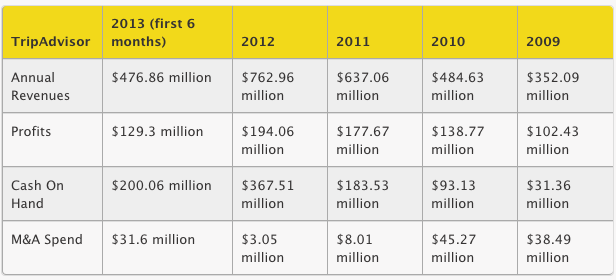Why does TripAdvisor keep buying small startups?
The companies are tiny. They're usually not integrated into the TripAdvisor juggernaut. So what's the point?

A free daily email with the biggest news stories of the day – and the best features from TheWeek.com
You are now subscribed
Your newsletter sign-up was successful

As large travel booking giants like Priceline and Expedia continue to do big-ticket digital acquisitions, the hotel reviews giant — and now-trying-to-become-hotel-metasearch company — TripAdvisor continues with its curious strategy of picking up tiny travel companies that have little apparent effect on its topline, and surely nothing on its bottomline.
According to its latest quarterly SEC 10-Q filing, TripAdvisor acquired five companies in the first six months of this year for a total cash price of $31.6 million. These five startups were: TinyPost, Jetsetter, CruiseWise, Niumba, and GateGuru.
Out of these five companies, CruiseWise and TinyPost together cost a little over $1 million, more of the acqhire variety, and the rest — Jetsetter, Niumba, and GateGuru — had $30 million spread between them. Our estimates is Jetsetter took the largest chunk of that, which means the sale price of GateGuru and Niumba were likely in the single digit millions.
The Week
Escape your echo chamber. Get the facts behind the news, plus analysis from multiple perspectives.

Sign up for The Week's Free Newsletters
From our morning news briefing to a weekly Good News Newsletter, get the best of The Week delivered directly to your inbox.
From our morning news briefing to a weekly Good News Newsletter, get the best of The Week delivered directly to your inbox.
The table below shows how stingy TripAdvisor has been over the years with money on hand, spending these amounts on a total of about 20 companies since 2009. In fact, its spend decreased drastically over the last two years, though it has picked up the pace this year.

For a company with annual revenues expected to reach close to $1 billion by the end of this year and a market cap now of over $10 billion, these acquisitions aren't just immaterial to the bottomline in the short term. The parts of the company these startups end up in are mostly inconsequential in the scheme of things for TripAdvisor's future business growth. And yet it intends to continue doing these small acquisitions going ahead, the company says.
Here's how CEO Steve Kaufer described his company's M&A strategy on its Q1 2013 earnings conference call this year:
The… lens through which I look at acquisitions is really furthering the core TripAdvisor offering globally. So we'd look at either something that adds lots of traffic in a market where we're not strong in, or something that adds technology or features to something that, in fact, we can roll out globally because, again, we're trying to leverage our traffic base, our content base, our reach, our membership, and those are pretty powerful assets that, if we brought a technology or a team, we can often make some nice hay with that.
But "nice hay" is putting it very generously. The only exception to the above immateriality rule have been TripAdvisor's vacation rental acquisitions such as Flipkey, HolidayLettings.co.uk, and Niumba, with Tingo and Jetsetter providing some more transactions over the last 18 months. Even all of these likely don't add up beyond mid-to-high-double digit millions in yearly revenues.
A free daily email with the biggest news stories of the day – and the best features from TheWeek.com
Others in its stable — AirfareWatchdog, BookingBuddy, CruiseCritic, Everytrail, FamilyVacationCritic, Gateguru, Holidaywatchdog, IndependentTraveler, Onetime.com, Seatguru, SmarterTravel, Travelpod, VirtualTourist, Whereivebeen, and Kuxun.cn – are small businesses at best, somehow fitting in TripAdvisor's larger goal of "providing comprehensive travel planning resources across the travel sector."
Besides the small size of these acquisitions, TripAdvisor has also left these companies as separate brands — often under the auspices of the Smarter Travel Media — with little integration into the main traffic juggernaut, except Flipkey's vacation rental listings on main TripAdvisor. On the other hand, it does integrate some Tripadvisor branding on these sites, with varying levels of integration. SeatGuru relaunched earlier this year with Tripadvisor's flight metasearch integration, for instance, and that would be an example of as deep an integration as it would do.
From sources we have spoken to, TripAdvisor usually doesn't mess with the management of these companies much, and certainly doesn't fund them extravagantly either.
Beyond this, the question becomes: What does Tripadvisor want to be, when it grows up beyond its dependence on user-generated media and lead generation at its core? For now it has stuck close to its core of providing "comprehensive travel planning," but will it embrace the actual transaction and booking phase in travel? Hotel metasearch is as large a step it can take in the transaction direction without actually being in it.
If it does, then it will surely have to reconsider its historically conservative strategy of small, immaterial acquisitions. Competing with Kayak, now owned by the heavy spending giant Priceline, and Expedia, which now owns European hotel metasearch biggie Trivago, will require a lot more heft than TripAdvisor's organic growth can sustain — especially if its own efforts in its hotel metasearch rollout and uptake remain slow, as TripAdvisor hinted at multiple times this year. It may soon have to start looking at larger acquisitions.
But then, what exists that could make a material difference to TripAdvisor's business, without turning off the shareholders? The only target that would qualify as a transformative acquisition for TripAdvisor would be HomeAway, with a $2.5 billion plus market cap and close to $300 million in revenues expected by end of the year. Nothing else comes close. Then there are material acquisitions adding to the technology for its main engine, such as hotel metasearch startup Room77.
Lastly would be business and marketing services aimed as a software-as-a-service to its core constituency of hotel clients, beyond what it offers as part of its TripAdvisor for Business unit. No travel-specific marketing service companies/startup is big enough to make any large difference to the company, but there are others larger digital marketing companies to pick up.
Your move, TripAdvisor.
More from Skift...